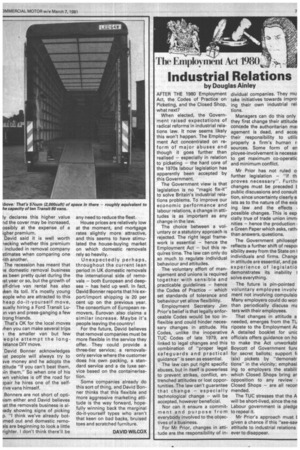The Employment Act 1980, 4 ,
Page 79

If you've noticed an error in this article please click here to report it so we can fix it.
Industrial Relations
by Douglas Ainley
AFTER THE 1980 Employment Act, the Codes of Practice on Picketing, and the Closed Shop, what next?
When elected, the Government raised expectations of radical reforms in industrial relations law. It now seems likely this won't happen. The Employment Act concentrated on reform of major abuses and though it goes further than realised — especially in relation to picketing — the hard core of the 1970s labour legislation has apparently been accepted by this Government.
The Government view is that legislation is no "magic fix-it" to solve Britain's industrial relations problems. To improve our economic performance and labour relations, a change in attitudes is as important as any change in the law.
The choice between a voluntary or a statutory approach is rejected. The right legal framework is essential — hence the Employment Act — but this requires time. The law can only do so much to regulate individual behaviour and attitudes.
The voluntary effort of management and unions is required together with sensible and practicable guidelines — hence the Codes of Practice — which set standards of tolerance and behaviour yet allow flexibility.
Employment Secretary Jim Prior's belief is that legally enforceable Codes would be too inflexible and could hinder necessary changes in attitude. His Codes, unlike the inoperative TUC Codes of late 1979, are linked to legal changes and this combination of "proper legal safeguards and practical guidance" is seen as essential.
The law can put right specific abuses, but in itself is powerless to prevent strikes, conflict, entrenched attitudes or lost opportunities. The law can't guarantee that change — especially technological change — will be accepted, however beneficial.
Nor can it ensure a commitment and purpose from everybody involved to the objectives of a business.
For Mr Prior, changes in attitude are the responsibility of in
dividual companies. They mu take initiatives towards impra ing their own industrial rel. tio Managers can do this only ns.
they first change their attitude concede the authoritarian mai agement is dead, and accel their responsibility to utilis properly a firm's human r, sources. Some form of en ployee-involvement is necessai to get maximum co-operatic and minimum conflict.
Mr Prior has not ruled a further legislation — "if th proves necessary". Furth( changes must be preceded t public discussions and consult tion, since uncertainty clearly e ists as to the nature of the exis ing law and the effects possible changes. This is esp dally true of trade union immi nities — hence the production! a Green Paper which asks, rathi than answers, questions.
The Government philosoph reflects a further shift of respoi sibility away from the State on individuals and firms. Change in attitude are essential, and pa: experience of legislatio demonstrates its inability I solve everything.
The future is pin-pointed voluntary employee involv ment not involving compulsio Many employers could do won than periodically discuss ms ters with their employees.
That changes in attitude a needed, emerges from the TIJ riposte to the Employment Ac A detailed booklet for unic officials offers guidance on ho to make the Act unworkabl Boycott of Government func for secret ballots; support f, (six) pickets by "demonstr tions" in the vicinity; emphasi ing to employers the stabili. which Closed Shops bring ar opposition to any review I Closed Shops — are all recon mended.
The TUC stresses that the A will be short-lived, since the ne: Labour government is pledgs to repeal it.
Mr Prior's approach must t given a chance if this "see-say attitude to industrial relations over to disappear.
























































































































